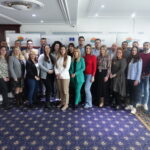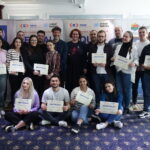Program description:
Social groups do not necessarily have to be a minority to be endangered, discriminated against, or denied participation in decision-making. We are witnessing circumstances in which members of large and even majority parts of society do not have equal conditions for making socially relevant decisions, participation in political life in the country, but also in their municipality. The lines of discrimination are multiple, so a person may find themselves at a disadvantage based on their physical or national characteristics, or place of residence.
The BFPE has traditionally promoted the improvement of the unequal starting position of women, Roma, young people, as well as residents of underdeveloped areas. We see the opening of opportunities for equal participation of these groups in the political process and decision-making, in the labor market, as well as in educational institutions at all levels as a necessary condition for the consolidation of democracy and the creation of a truly open society.
We are also worried about the risk of marginalization of everything that is local, whether it is development priorities, the state of local democracy and citizen participation in political processes, processes observed in the context of European integration, and expectations from local governments.
This is why we have placed the political participation of under-represented groups, especially women and youth, among the most important pillars in our work since its inception. One of our recent projects has resulted in the successful establishment of the Women’s Parliamentary Network, an informal but visible form of empowerment of women politicians and a major step towards strengthening Parliament itself. Through working with other minority and/or vulnerable groups (eg National Councils of National Minorities, civil society representing vulnerable groups, etc.), the BFPE addressed issues of social inclusion, anti-discrimination, poverty reduction and human rights, gender equality, and time insisted on the political empowerment of these groups.
At the same time, sustainable development in a society can only be ensured by raising education and science to the level of a strategic priority. This is still not the case in Serbia, where only 0.5% of GDP is devoted to science. From roundtables to public hearings in Parliament, the BFPE insists on the need to implement a development-based education strategy; “Converting” “brain drain” into “brain gain”; cooperation with our experts abroad as a link with the most modern scientific projects; by engaging them as guest lecturers and researchers and involving them in public debates on the most important development issues.
The BFPE therefore also explores the problems arising from the complex relationship created by mixed migration and development; including the processes of readmission, integration, “brain drain” and ways of its prevention.
BFPE implements its activities in this area in close partnership and understanding with Group 484, United Nations Development Programme (UNDP) in Serbia, GIZ, and SIPRU Team.
All programs in this segment:
BFPE offers comprehensive programs, adapted to the actual needs and challenges met at both local and national level of government, celebrating participant experiences while avoiding ex cathedra approach.
From My Town to My Country: How to Ensure Serbia’s Development?
Project objective is to bring together representatives of local communities in order to stimulate the debate on the recognition of local specificities and identities as well as the importance and role local communities play in the development of Serbia.
Sustainable Reintegration of Roma Returnees and Internally Displaced Persons in Niska Banja through Housing and Economic Empowerment
The project is a one-year program aimed at contributing to the full social and economic inclusion of returnees under the Readmission Agreement and IDPs who have decided to stay in Serbia by promoting a sustainable concept of (re) integration of returnees and IDPs, especially Roma, by applying a successfully tested model of cooperation between civil society organisations, local governments and the private sector.
Investing in (Municipal) Resilience
With support of and in partnership with UNDP Istanbul Regional Hub for Europe and the CIS, UNDP Serbia, and Public Investment Office (of the Govt. of Serbia), BFPE organized the conference "Investing in (Municipal) Resilience" on 23-24 November 2017.
Local self governments, civil society organizations and media for more responsible public finances
The goal of the initiative is to establish continuous cooperation, understanding and constructive dialogue between local governments and non-state actors in local communities in the area of public finance management.
Consultations with civil society of Serbia on UN MDGs (millenium development goals) of sustainable development post-2015
The United Nations in Serbia, in cooperation with the Belgrade Fund for Political Excellence and SeConS, conducted national consultations www.srbijakakvuzelim.rs, which helped define development priorities for the period after 2015 and became an integral part of the global UN report.









